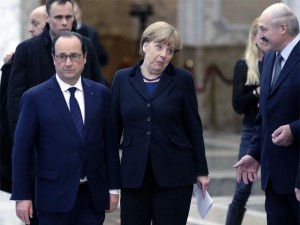The Belarusan National Platform of the EaP CSF issued a statement in connection with the wave of searches in the editorial offices of the Belarusan media and the detention of journalists.
Aksana Shelest: The notion of “public dialog” is being expertized and narrowed

Belarusan civil society has to prepare for yet another attempt to imitate representation in Belarus-Europe dialog, this time by using experts, not representatives of civil society or non-governmental organizations.
On December 29 within the framework of the new project “Public dialog” first meeting of round table discussion “Belarus-Europe relations after the Vilnius Summit of the Eastern Partnership” was held in Minsk. The event was attended by representatives from the Foreign Ministry, European mission to Belarus, Foreign Policy and Security Research Center, Belarusian Institute for Strategic Studies (BISS).
Aksana Shelest, the expert of the Humanitarian Techniques Agency, the senior analyst of the Centre for European transformation commented to the EuroBelarus Information Service about the exchange of remarks happened during the two-hour session.
According to Rodolphe Richard, head of Political, Press and Information Section at the EU Delegation to Belarus, Belarus-European relations witnessed significant improvements last year. “The EU suspended its sanctions against the foreign minister Vladimir Makei. Diplomatic communication between Belarus, the European Union and the member countries has increased,” he believes. Still, there are certain barriers to the complete normalization of relations between the EU and Belarus that cannot be removed without specific steps by Belarus; the main of which is to resolve the problem of political prisoners.
Aleh Shloma, a senior official at the Belarusian foreign ministry’s European Cooperation Directorate, said he sees “serious perspective for developing of cooperation in applicative spheres.” As to the problem of political prisoners, this issue is familiar to everybody. However, the solution of this problem, as Shloma has warned, doesn’t mean that “even if these people leave prison tomorrow, Belarus will not automatically become a great friend of the EU that is showered with its money.” According to Shloma, “negative phenomena have been snowballing, and it will take lots of time and common effort to overcome it.”
Dzianis Melyantsou, analyst at the Belarusan Institute for Strategic Studies (BISS), claims that complete rebranding of the European dialogue on Modernization with Belarusan society (EDoM) is not at issue: “It’s not about that; EDoM still invites all spheres of Belarusan society for dialog. Besides, European Commission asked BISS to create a certain phase in this dialog. We named this project “Reforum”. And our goal in this two-year project is to implement the notion of the dialog to the full. Four forums are likely to take place: for the civil society, for the opposition, for business and for the representatives of the state. Within these forums invited experts will try to determine the most important reforms.”
“I believe that it is hard to find something absolutely new from the round table discussion,” notes Aksana Shelest. “The dialog between the diplomats is but another attempt to unfreeze Belarus-Europe relations. Each side declares openness and readiness to cooperate with adherence to the principles, which are pragmatism and conclusiveness for Belarus and “more for more” principle and value base of European policy of cooperation.”
According to Aksana Shelest, “this discussion can go on forever, so something has to be waived, though we should save our face, too.”
“In this context the format of the meeting, which is newly fledged “Public dialog”, is more important than its contents. After we solve the problem of political prisoners, participation of political opposition and civil society in Belarus-Europe dialog will become another stumbling block. This issue more than once encountered the resistance of the regime. Thus, the previous initiative in this direction — European Dialog on Modernization — has changed beyond recognition.”
Aksana Shelest emphasizes, that “EDoM now comes to creation of forums, or the so-called “segregations” for the possible stake-holders and to expert work.”
“Which is significant, as the notion of “public dialog” is becoming increasingly more expertized, while the political and stake-holder’s part disappears. This means that the Belarusan civil society has to prepare for yet another attempt to imitate representation in Belarus-Europe dialog, this time by using experts, not representatives of civil society or non-governmental organizations. However, how feasible such manipulations will be depends on whether the civil society is prepared, as well as whether Europe is ready to take intent look at their partners.”
Others
-
Statement of the Belarusan EaP CSF National Platform on solidarity with the civil society of Armenia
The Belarusan National Platform of the Eastern Partnership Civil Society Forum issued a statement on solidarity with the civil society of Armenia.
-
Statement of the BNP in connection with the criminal prosecution of the leaders of the Belarusan independent trade unions
The Belarusan National Platform of the Eastern Partnership Civil Society Forum issued a statement in connection with the criminal prosecution of the leaders of the Belarusan independent trade unions.
-
Final event of project CHOICE — Paving the way to European Year of Cultural Heritage 2018
The final event of the two-year EU funded project CHOICE — Cultural Heritage: Opportunity for Improving Civic Engagement was held on June 6, 2017 at the Committee of the Regions, in Brussels.
-
Heritage is a verb. The results of the CHOICE project were summarized in Minsk (Photos and video)
Does Belarus need a “Public Ministry of Culture” and “Ašmiany Charter” to deal with the historical and cultural sites?








Comments
From farewell to a new Eastern policy and towards a new development
Poland and Germany were both initiators and drivers of a New Eastern policy linked to the Eastern neighborhood and Russia/Soviet Union.